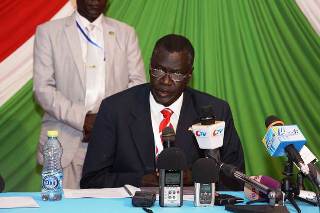We stand for federalism, CES governor tells civil servants
June 5, 2014 (JUBA) – South Sudan’s Central Equatoria state top executive has declared there is no turning back on the demand for a federal system of governance in the new born country, contrary to the objections by the president Salva Kiir.

On Thursday, Konga went ahead by organising a workshop to brief the civil servants about the state government’s position in support of the federal system of governance during which thousands of civil servants from Central Equatoria state participated.
Konga told the gathering at Nyakuron Culture Center in the national capital, Juba, that the people of Central Equatoria state are for a federal system and that they would not back down from the will of the people.
While addressing the country’s national parliament on Monday, president Kiir criticised the demand for a federal system by the rebel leader Riek Machar, saying this was a ploy to divide the “internal front” and that citizens be allowed to decide on the matter.
“The issue of federalism that is seems used by Riek Machar on pretext that he wants to divide the internal front is not really viable at all because federalism has been the demand of people of South Sudan for a long time even before the independence of Sudan,” said president Kiir.
He further observed that a federalism system was what southern Sudan demanded for from north Sudan during the 1947 Juba conference.
Governor Konga, however, said “some people misinformed President Salva Kiir” with reports about their call for a federal system in South Sudan, clarifying that their position did not mean support to the armed opposition group.
He further added that it is the will of the people that should be championed, arguing that South Sudan does not belong to a single leader.
“No, South Sudan is not for Salva Kiir, not for me [Clement], not even for Riek Machar. South Sudan is for all South Sudanese people,” he told the gathering.
He further disclosed that a delegation will be sent to Upper Nile state to consult with the like-minds there, but said this should not be seen as a collaboration with the rebel group.
“It should not look that if people dialogue with the people of Malakal this will mean that I, Konga, am following Riek Machar. No, I am not going after Riek Machar,” he further argued.
He also revealed that a six-person delegation, two each to represent the three states of Central, Eastern and Western Equatoria, will be sent to the peace talks in Addis Ababa to represent the views of Greater Equatoria region.
Federalism is system of governance in which powers including fiscal ones are devolved to the state governments, leaving the centre with less power that aims to coordinate among various states. However, army and foreign affairs remain exclusively under the powers of the national government.
The current renewed debate on federalism came to light after the rebel group under the leadership of the former vice president, Riek Machar, demanded at the Addis Ababa peace talks that South Sudan as a state should be restructured based on a federal system in order to avoid the abuse of power and misuse of wealth by the centre.
(ST)
